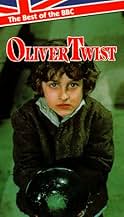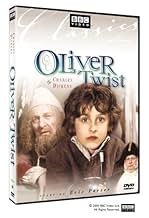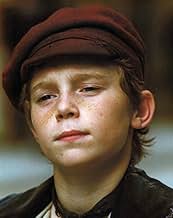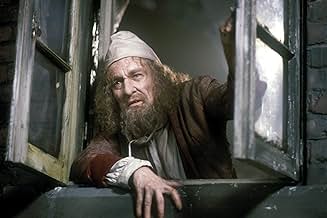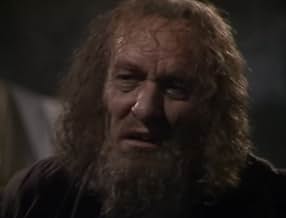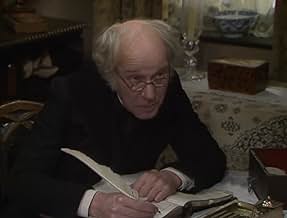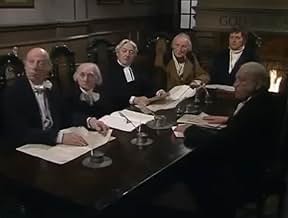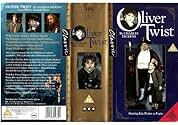Füge eine Handlung in deiner Sprache hinzuAn orphan named Oliver Twist meets a pickpocket on the streets of London. From there, he joins a household of boys who are trained to steal for their master.An orphan named Oliver Twist meets a pickpocket on the streets of London. From there, he joins a household of boys who are trained to steal for their master.An orphan named Oliver Twist meets a pickpocket on the streets of London. From there, he joins a household of boys who are trained to steal for their master.
- Auszeichnungen
- 1 Nominierung insgesamt
Folgen durchsuchen
Empfohlene Bewertungen
An almost perfect version of Oliver Twist. The biggest problems with any Oliver adaptation is Monks' storyline, everything with the Maylies, and Oliver being related to Brownlow... all of which is a key part of this book faithful miniseries, which is part of why I love BBC adaptations of literary classics. However, all that unnecessary and contrived backstory and subplots are of Dickens' doing, not really the writers of the series.
Oliver being related to Brownlow feels incredibly contrived, convenient, and forced, and I think it is a better story if Brownlow simply takes pity on the half starved and sickly Oliver because he is a good person, instead of the weird bloodline spiritual connection alluded to in the book. As much maturity and realism Dickens created, these elements are stupid and silly.
I also must say, with everyone in the supporting cast being PERFECT, Nancy, Bill, Fagin, Brownlow, Mr Bumble and Ms Corney, The Dodger... but the one casting choice that was lacking something was Oliver himself. The first actor who plays the younger Oliver was good, and I really wish they kept him through the whole thing, because the older version of him was incredibly boring, and left next to no impression. His accent is oddly muddled, what I think may be Irish, it was a little distracting, and like I said, he had little to no personality whatsoever, which didn't exactly make me sympathize with him like you are supposed to.
I have to say that Jackie Coogan is still my favorite Oliver, with his big puppy dog eyes, scruffy hair, and adorable persona. He is one of the only Olivers to shine through what is arguably a rather bland character. I guess he is sort of like Alice of Wonderland in that way, being the character everything is happening too, guiding you from one place to the next, meeting a variety of characters. You almost see things through his eyes.
Anyway, all that didn't bog down the series as much as my biggest problem with this series, that being the horribly boring romance between Rose and Harry, which feels like it came straight from an annoying Jane Austen story. It was almost unbearable. Compare this to the romance between Bill and Nancy, and you have some ACTUAL drama on display, that isn't the typical period piece crap that a theater kid would fawn over. Ugh, I really hated it.
I love the story of Oliver Twist, I have since I was 9 years old, and watched the 2005 version all the way through. After that, from the age of 9-13, I watched every version out there, all except two or so, which is what I have done with all my favorite stories growing up.
I saw this miniseries when I was 9, and liked it okay, being a huge fan of other faithful BBC literary miniseries adaptations as a kid, like "The Secret Garden" and "A Little Princess". I watched this version again the other day, and liked it more than I had done before, enough to where I want to watch through all 5 something hours of it all over again.
The BBC is great because they let things play out, as if you are actually watching the lives of human beings, not a movie that is hyper focused with getting from point A to point B. And the TV video tape picture quality of these BBC serials is the definition of "cozy" for me. Not one of my favorite BBC literary adaptations from around this time, nor my favorite version of Oliver, but one of the best and most faithful adaptations to date, which I suppose that is a little for better or worse in this instance.
Oliver being related to Brownlow feels incredibly contrived, convenient, and forced, and I think it is a better story if Brownlow simply takes pity on the half starved and sickly Oliver because he is a good person, instead of the weird bloodline spiritual connection alluded to in the book. As much maturity and realism Dickens created, these elements are stupid and silly.
I also must say, with everyone in the supporting cast being PERFECT, Nancy, Bill, Fagin, Brownlow, Mr Bumble and Ms Corney, The Dodger... but the one casting choice that was lacking something was Oliver himself. The first actor who plays the younger Oliver was good, and I really wish they kept him through the whole thing, because the older version of him was incredibly boring, and left next to no impression. His accent is oddly muddled, what I think may be Irish, it was a little distracting, and like I said, he had little to no personality whatsoever, which didn't exactly make me sympathize with him like you are supposed to.
I have to say that Jackie Coogan is still my favorite Oliver, with his big puppy dog eyes, scruffy hair, and adorable persona. He is one of the only Olivers to shine through what is arguably a rather bland character. I guess he is sort of like Alice of Wonderland in that way, being the character everything is happening too, guiding you from one place to the next, meeting a variety of characters. You almost see things through his eyes.
Anyway, all that didn't bog down the series as much as my biggest problem with this series, that being the horribly boring romance between Rose and Harry, which feels like it came straight from an annoying Jane Austen story. It was almost unbearable. Compare this to the romance between Bill and Nancy, and you have some ACTUAL drama on display, that isn't the typical period piece crap that a theater kid would fawn over. Ugh, I really hated it.
I love the story of Oliver Twist, I have since I was 9 years old, and watched the 2005 version all the way through. After that, from the age of 9-13, I watched every version out there, all except two or so, which is what I have done with all my favorite stories growing up.
I saw this miniseries when I was 9, and liked it okay, being a huge fan of other faithful BBC literary miniseries adaptations as a kid, like "The Secret Garden" and "A Little Princess". I watched this version again the other day, and liked it more than I had done before, enough to where I want to watch through all 5 something hours of it all over again.
The BBC is great because they let things play out, as if you are actually watching the lives of human beings, not a movie that is hyper focused with getting from point A to point B. And the TV video tape picture quality of these BBC serials is the definition of "cozy" for me. Not one of my favorite BBC literary adaptations from around this time, nor my favorite version of Oliver, but one of the best and most faithful adaptations to date, which I suppose that is a little for better or worse in this instance.
OLIVER TWIST films live or die by their Olivers and this ultra-faithful six-hour British mini, dies with two inadequate Olivers. Not that the rest of the cast does much better. No one seems able to sustain the heightened characterizations Dickens needs, giving us a sort of loud, generic hamminess that quickly wears out its welcome. Even so, it's a treat to (just once) get all the story (the Artful Dodger has some surprising character turns), and it's certainly preferable to a recent mini-series which added a 'clarifying' preface. Memorable versions by Frank Lloyd, David Lean & Carol Reed each lose almost half of the story; for the better say I. With early Dickens, small sins of omission do wonders for story construction, especially in keeping Oliver in personal danger for the climax.
This version keeps a lot more of the novel than most, but most of this material lacking in other versions covers the Maylie sub-plot, which is mawkish and conventional Victoriana.
Many reviewers have commented that the series does not stint on the squalor of Hanoverian London (the action takes place in pre-Victorian times). I actually disagree and feel that it sanitizes things. Reviewers write of the "cramped" rooms when I thought they were were more spacious than many a million pound flat in today's London.
The direction, camera-work and score were plodding TV quality only, and the actors in some parts unsubtle. Bill Sykes looked the part, and for once you could see why Nancy might have been attracted to him, but his acting skills were one-dimensional. I liked Eric Porter's Fagin. It was based on the Guinness version, but without the anti-semitic element which is embarrassing in the earlier movie.
Too many of the children's roles suggested middle-class kids from drama school.
I give the makers credit for faithfulness and not attempting smart-ass interpolations or anachronistic social comment, and maybe enjoyment would be enhanced by watching in the original 12 half-hour episodes, but viewing it purely as a "movie" it is fairly dull, especially compared to David Lean's masterpiece. Sharper editing would help to speed things along.
Many reviewers have commented that the series does not stint on the squalor of Hanoverian London (the action takes place in pre-Victorian times). I actually disagree and feel that it sanitizes things. Reviewers write of the "cramped" rooms when I thought they were were more spacious than many a million pound flat in today's London.
The direction, camera-work and score were plodding TV quality only, and the actors in some parts unsubtle. Bill Sykes looked the part, and for once you could see why Nancy might have been attracted to him, but his acting skills were one-dimensional. I liked Eric Porter's Fagin. It was based on the Guinness version, but without the anti-semitic element which is embarrassing in the earlier movie.
Too many of the children's roles suggested middle-class kids from drama school.
I give the makers credit for faithfulness and not attempting smart-ass interpolations or anachronistic social comment, and maybe enjoyment would be enhanced by watching in the original 12 half-hour episodes, but viewing it purely as a "movie" it is fairly dull, especially compared to David Lean's masterpiece. Sharper editing would help to speed things along.
The BBC really know how to 'do' Dickens.
From Dudley Simpson's haunting title music to Eric Porter's sinister Fagin, this is truest adaptation of the book that I know.
The production values are spot-on, capturing the filth and seediness of Dickens' London. Michael Attwell is the most menacing of Bill Sykes and Ben Rodska makes Oliver innocent without being too goody-goody.
If that were not enough, the length of the production (6 hours) means that, for once, the sub-plots are included and the main plots are laid out as Dickens wrote them.
If 6 hours is too long then David Lean still represents the safest bet but, for the purist, this will probably never be improved upon.
From Dudley Simpson's haunting title music to Eric Porter's sinister Fagin, this is truest adaptation of the book that I know.
The production values are spot-on, capturing the filth and seediness of Dickens' London. Michael Attwell is the most menacing of Bill Sykes and Ben Rodska makes Oliver innocent without being too goody-goody.
If that were not enough, the length of the production (6 hours) means that, for once, the sub-plots are included and the main plots are laid out as Dickens wrote them.
If 6 hours is too long then David Lean still represents the safest bet but, for the purist, this will probably never be improved upon.
It is not easy televising Dickens. His novels are so vivid you have a picture of the characters in your mind. This series uses its 12 29 minute parts to make the images its own and enhance them. I could get carried away with superlatives so let's look at the negatives which really centre on the Maylie household. This takes up the best part of 2 or 3 episodes and is pretty dull. The first couple of episodes are difficult but that is part of the acclimatisation process noted above. Now onto the superlatives.
The BBC has done an amazing job in conjuring up both the riches of the middle classes but more importantly the desperate poverty on the streets. The state of Fagin's quarters and Sykes' disgusting one room hovel are hard to contemplate. The state of the Thames is reminiscent of Dickens' telling.
The acting is top class. Too many to mention but Eric Porter as sly, devious, charming and mercenary Fagin is one, Michael Attwell brings menace to Bill Sykes. Pip Donaghy triumphs as Monks. Godfrey James as bully boy Mr Bumble and Miriam Margoyles as his soon to be domineering wife. The list goes on. So refreshing to see a case of actors building on substantial roles.
The story is modified: Betsy disappears altogether and Monks takes on a starring role. The last few parts are riveting as the net closes. I could go on. TV does not get much better
The BBC has done an amazing job in conjuring up both the riches of the middle classes but more importantly the desperate poverty on the streets. The state of Fagin's quarters and Sykes' disgusting one room hovel are hard to contemplate. The state of the Thames is reminiscent of Dickens' telling.
The acting is top class. Too many to mention but Eric Porter as sly, devious, charming and mercenary Fagin is one, Michael Attwell brings menace to Bill Sykes. Pip Donaghy triumphs as Monks. Godfrey James as bully boy Mr Bumble and Miriam Margoyles as his soon to be domineering wife. The list goes on. So refreshing to see a case of actors building on substantial roles.
The story is modified: Betsy disappears altogether and Monks takes on a starring role. The last few parts are riveting as the net closes. I could go on. TV does not get much better
Wusstest du schon
- WissenswertesOf the 30 or so filmed versions of the same Charles Dickens novel (excluding indirect adaptations and parodies such as Oliver & Co. (1988)), this is considered the most complete and accurate adaptation, as it manages to depict almost all of the characters and incidents from the book.
- VerbindungenFeatured in Terrance Dicks: Fact & Fiction (2005)
Top-Auswahl
Melde dich zum Bewerten an und greife auf die Watchlist für personalisierte Empfehlungen zu.
- How many seasons does Oliver Twist have?Powered by Alexa
Details
- Laufzeit
- 6 Std.(360 min)
- Farbe
Zu dieser Seite beitragen
Bearbeitung vorschlagen oder fehlenden Inhalt hinzufügen

